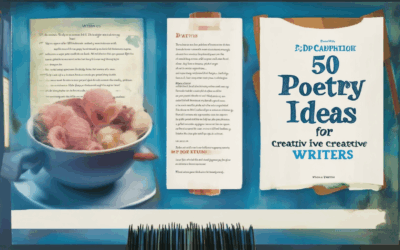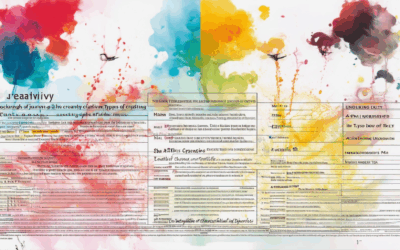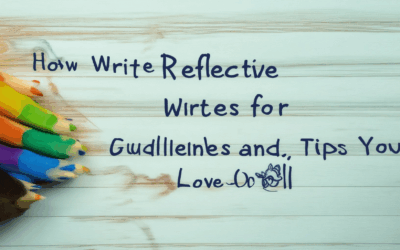Writing is an art that requires not just technical proficiency but also a spark of creativity to truly captivate audiences. However, many writers face significant challenges in channeling their creativity, often struggling with writer’s block, maintaining consistency, and embracing feedback. These hurdles can hinder progress and leave writers feeling stuck. But the good news is that there are proven strategies and techniques to overcome these obstacles. From leveraging writing exercises and mindfulness practices to exploring diverse genres and staying inspired, this guide dives into the nitty-gritty of creative writing challenges and offers actionable solutions. Whether you’re a seasoned writer looking to reignite your passion or a novice eager to unlock your potential, this comprehensive exploration will equip you with the tools and mindset needed to excel. By understanding the 5 Cs of creative writing—curiosity, courage, creativity, connection, and consistency—you can build a strong foundation for your craft. Additionally, discover how daily habits, a growth mindset, and a willingness to explore new perspectives can keep your creativity flowing and your productivity soaring. This article is your ultimate roadmap to mastering the art of writing while overcoming every challenge along the way.
Key Takeaways
- Identify your niche within creative writing genres to tailor your style and resonate with your audience.
- Expand your vocabulary and explore diverse literature to enhance your ability to convey unique ideas.
- Practice daily to build consistency and keep your creativity fresh.
- Experiment with genres to broaden your skills and open new creative avenues.
- Join writing communities for feedback and collaboration to improve your craft.
- Set clear goals to stay motivated and achieve your aspirations.
- Understand your audience to tailor your language and ensure your work resonates effectively.
- Leverage the power of creativity by exploring different thinking types to drive innovation.
- Stay curious and explore diverse perspectives to enrich your storytelling capabilities.
- Use resources like Silken Drum to enhance your creative process and discover useful tools.

Challenges of Creative Writing
Creative writing is a rewarding yet challenging endeavor that requires patience, dedication, and a unique perspective. Below are some of the most common challenges faced by writers and ways to overcome them:
- Time Management : Balancing writing projects with daily life can be overwhelming. To manage this, establish a consistent routine and set realistic deadlines. Prioritize tasks based on urgency and importance.
- Inspiration and Creativity : Writers often face periods of writer’s block where ideas seem stagnant. To combat this, explore new experiences, read diverse genres, and maintain a journal to capture everyday inspiration.
- Editing and Revising : Many writers struggle with editing their own work. Develop a habit of self-criticism and seek feedback from peers or professional editors to refine your manuscript.
- Understanding the Audience : Connecting with your readers is crucial. Research your target audience’s preferences and tailor your writing style to resonate with them.
- Overcoming Self-Doubt : Confidence in your abilities is key. Practice regularly, embrace constructive criticism, and recognize that writing is a process that improves over time.
- Staying Consistent : Building a successful writing career requires consistency. Set goals, track your progress, and stay committed to your passion even during tough times.
Silken Drum understands the struggles of creative writing and offers a supportive community for writers of all levels. Explore our resources and connect with fellow writers to inspire and grow your craft. Visit us today at Silken Drum to discover more tools and opportunities for your creative journey.
What are the 5 C’s of creative writing?
The 5 C’s of creative writing are a fundamental framework for developing effective and engaging narratives. These principles guide writers in crafting stories, poems, and other forms of creative expression. Here’s a breakdown of each component:
- Content :
The foundation of creative writing lies in having a solid idea or theme. Effective content is driven by a clear purpose, whether it’s telling a story, conveying emotions, or exploring a concept. A strong content idea ensures that your work has direction and meaning. For instance, choosing a unique theme or introducing a significant conflict can elevate your storytelling. - Craft :
Crafting your ideas requires attention to detail and skill. This involves mastering techniques such as dialogue, description, and pacing to keep readers engaged. A well-crafted piece demonstrates technical proficiency, making it visually appealing and emotionally resonant. Consider how your words evoke imagery or elicit feelings, which are essential for immersive experiences. - Creativity :
Creativity is the spark that ignites your writing. It’s about thinking outside the box and bringing unique perspectives to your work. Whether it’s experimenting with metaphors or reimagining familiar tropes, creativity keeps your writing fresh and original. Embrace curiosity and experimentation to unlock new possibilities in your craft. - Clarity :
While creativity drives your ideas, clarity ensures they are effectively communicated. Your audience should understand and connect with your message without getting lost in confusing language or unclear structures. Aim for simplicity and precision in your prose to convey your intended meaning clearly. - Coherence :
Coherence ties your work together, ensuring it feels seamless and logical. This involves maintaining consistency in tone, style, and plot progression. A coherent narrative guides readers smoothly from one point to another, whether it’s through sequential events or thematic connections. It’s what makes your work feel intentional and impactful.
By focusing on these five components, writers can create works that are not only meaningful but also memorable. Each element builds upon the others, forming a cohesive and compelling piece that resonates with readers.

What are the 5 R’s of creative writing?
The 5 R’s of creative writing are a framework developed by author and teacher Lawrence Gutkind to guide aspiring writers in crafting compelling narratives. These principles emphasize the importance of authenticity, exploration, and structure in creating meaningful stories. Here’s a breakdown of each:
- Real Life : Creative writing often draws from personal experiences and observations. Writers immerse themselves in real-life situations, whether through journaling, conducting interviews, or participating in communities, to gather authentic material.
- Reflection : After experiencing something, writers reflect on their emotions, thoughts, and reactions. This introspection helps transform raw experiences into coherent and resonant stories.
- Research : Thorough research is essential for accuracy and depth. Writers may interview subjects, review historical documents, or explore cultural contexts to ensure their work is informed and credible.
- Reading : A strong foundation in literature is crucial. Writers read widely to understand different writing styles, genres, and perspectives, which inspires their own creativity and helps them develop unique voices.
- Writing : Finally, writers apply their knowledge and skills to craft their ideas into compelling narratives. This involves experimenting with language, structure, and tone to convey their message effectively.
By mastering these five elements, writers can create works that are deeply personal, thought-provoking, and universally relatable. At Silken Drum, we encourage writers to embrace these principles and share their unique stories with our community. Explore our resources and forums to inspire your next creative project today!

Types of Creative Writing
- Fiction
- Novels
- Short Stories
- Poetry
- Scripts
- Non-Fiction
- Articles
- Biographies
- Memoirs
- Essays
- Poetry
- Lyrics
- Haiku
- Free Verse
- Drama
- Plays
- Screenplays
- Scripts
- Screenwriting
- Feature Films
- Television Shows
- Documentaries
- Erotica
- Romantic Fiction
- Sexual Fantasy
- Intimate Stories
- Hybrid Genres
- Speculative Fiction
- Science Fiction
- Fantasy
Understanding these types of creative writing can help writers identify their niche and develop unique styles that resonate with their audience. Whether you prefer crafting intricate plots in fiction or exploring real-life experiences in non-fiction, there’s a genre for every interest and skill level.
How to Improve Creative Writing Skills
To enhance your creative writing abilities, consider implementing the following strategies:
- Expand Your Vocabulary : Regularly read diverse literature to expose yourself to new words and sentence structures. This broadens your vocabulary and enhances your ability to convey ideas uniquely.
- Practice Daily : Consistency is key. Dedicate time each day to write, even if it’s just a short piece. This habit helps develop your style and keeps your creativity fresh.
- Study Great Writers : Analyze works from authors you admire. Pay attention to their structure, tone, and use of imagery to inspire your own writing.
- Experiment with Genres : Explore various forms of writing, such as poetry, short stories, essays, or scripts. This broadens your skills and opens new creative avenues.
- Join Writing Communities : Engage with fellow writers through groups, workshops, or online platforms. Feedback and collaboration can significantly improve your craft.
- Seek Feedback : Share your work with trusted peers or mentors. Their insights can reveal strengths and areas for growth, helping you refine your approach.
- Set Goals : Define both short-term and long-term objectives. Whether aiming to write a certain type of piece or completing a project, having targets keeps you motivated.
- Read Critically : Analyzing published works teaches you about pacing, dialogue, and narrative techniques. This knowledge can transform your own writing.
- Understand Your Audience : Consider who your readers might be and tailor your language accordingly. This ensures your work resonates effectively.
- Practice Editing : After drafting, revise your work to eliminate redundancies and enhance clarity. This step is crucial for producing polished pieces.
- Stay Inspired : Keep a journal of ideas, quotes, or scenes that spark creativity. Review it periodically to reignite inspiration.
- Take Writing Workshops : Participate in classes or workshops led by experienced writers. These offer hands-on learning and networking opportunities.
- Write What You Love : Passion drives creativity. Choose topics and styles that excite you, leading to more engaging and authentic work.
- Learn Grammar and Syntax : A solid grasp of language mechanics supports clear and effective communication in your writing.
- Teach Others : Explaining concepts to others reinforces your understanding and helps identify gaps in your knowledge.
- Explore Different Perspectives : Write from various viewpoints to broaden your storytelling capabilities and deepen your emotional resonance.
- Use Silken Drum Resources : Discover tools and guides on Silken Drum to further enhance your creative process.
- Engage in Writing Challenges : Join challenges like NaNoWriMo to push your limits and foster discipline.
- Stay Curious : Always ask questions and seek new experiences. This curiosity fuels continuous learning and growth.
- Review Your Progress : Regularly assess your progress to track improvements and adjust your strategy as needed.
By consistently applying these strategies, you can elevate your creative writing skills and produce work that captivates readers. Remember, practice and patience are key to becoming a skilled writer.

What Are the 8 Types of Creativity?
Here’s a breakdown of the 8 primary types of creativity, each offering unique approaches to generating ideas and solving problems:
- Divergent Thinking
- Characterized by exploring a wide range of possibilities and ideas.
- Example: Einstein’s theory of relativity emerged from his ability to visualize alternative realities.
- Convergent Thinking
- Involves narrowing down options to find a single, effective solution.
- Example: Engineers use this approach to design efficient machines.
- Intuitive Thinking
- Relies on gut feelings or instinct rather than logical analysis.
- Example: Artists often use intuition to create emotionally resonant works.
- Deliberate Thinking
- Involves careful analysis and planning to reach a logical conclusion.
- Example: Mathematicians use this method to prove complex theories.
- Creative Problem-Solving
- Combines creativity with logic to devise innovative solutions.
- Example: Designers use this approach to develop groundbreaking products.
- Critical Thinking
- Involves evaluating evidence and arguments to assess ideas.
- Example: Journalists use this skill to uncover factual inaccuracies.
- Emotional Creativity
- Focuses on expressing feelings and connecting deeply with an audience.
- Example: Writers use emotional creativity to craft compelling narratives.
- Cognitive Creativity
- Involves reorganizing knowledge to form novel ideas or connections.
- Example: Scientists use this to develop revolutionary theories in their fields.
- Self-Directed Creativity
- Occurs when individuals take initiative to generate ideas independently.
- Example: Entrepreneurs often exhibit this trait when founding businesses.
- Collaborative Creativity
- Arises from teamwork and shared brainstorming sessions.
- Example: Software developers collaborate to create functional applications.
By understanding and leveraging these creativity types, individuals can unlock their potential and drive innovation across various domains.




0 Comments